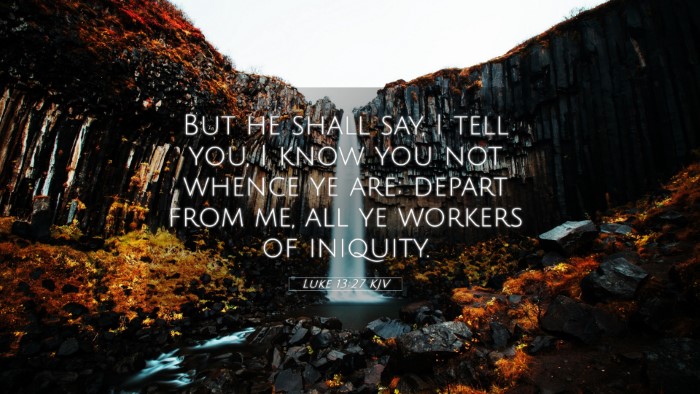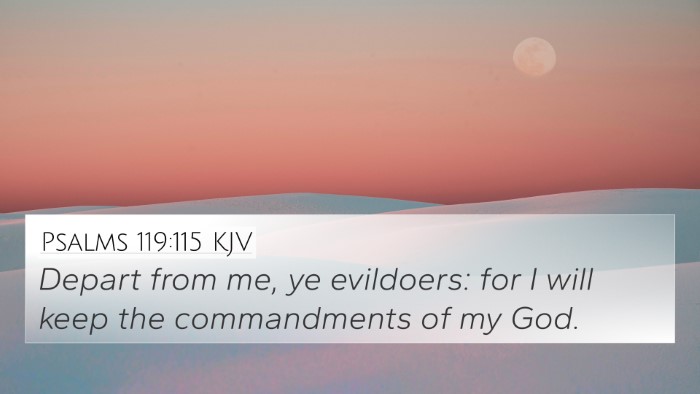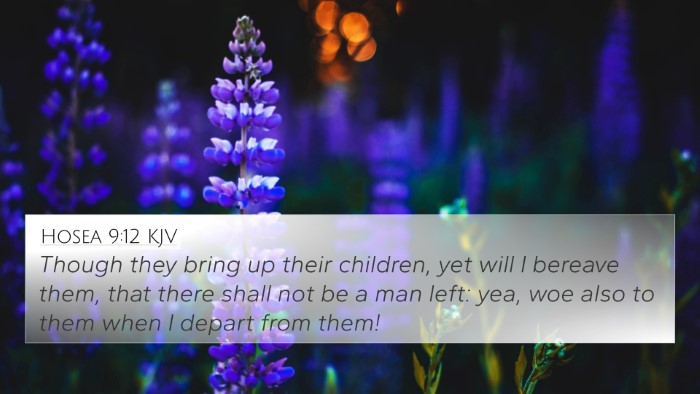Understanding Luke 13:27
Luke 13:27 states: "But he shall say, I tell you, I know you not whence ye are; depart from me, all ye workers of iniquity." This verse carries profound implications for anyone seeking to explore the themes of accountability, judgment, and the relationship between faith and actions.
Summary of Meaning
This verse occurs within a larger context where Jesus teaches about the nature of the kingdom of God and the final judgment. It serves as a stark reminder that not all who claim association with Christ will partake in His kingdom.
Insights from Public Domain Commentaries
- Matthew Henry: Henry emphasizes that this statement reflects the importance of genuine relationship with God over mere outward appearances. The phrase "I know you not" indicates a lack of true acquaintance or heart connection with the Lord.
- Albert Barnes: Barnes suggests that the workers of iniquity are those who engage in sinful practices despite their assertions of faith. He warns of the delusion that one can be intellectually aware of Christ without genuine obedience and transformation.
- Adam Clarke: Clarke notes that this verse also warns against the false security that comes from assumed identity as believers. The passage calls for self-examination and a continuous pursuit of righteousness to avoid the fate of exclusion.
Inter-Biblical Connections
Luke 13:27 resonates with various themes throughout Scripture. Below are some key cross-references that illuminate its message:
- Matthew 7:21-23: Jesus warns that merely calling Him "Lord" is insufficient; one must do the will of the Father.
- Luke 16:19-31: The story of the rich man and Lazarus illustrates the reality of judgment and the consequences of one's earthly choices.
- Matthew 25:10-12: The parable of the ten virgins highlights preparedness and the rejection of those unready for the Bridegroom.
- John 10:27: Jesus states that His sheep know His voice, which implies a relationship of recognition and intimacy.
- Romans 2:6-8: Paul writes that God will judge everyone according to their deeds, affirming the importance of actions in expressing faith.
- Galatians 5:19-21: A clear enumeration of the fruits of a life in sin contrasts with the fruits of the Spirit, underscoring the separation of genuine believers from iniquity.
- Revelation 21:8: This passage lists those who will not enter the kingdom, including the fearful and unbelieving, reaffirming the impact of one's choices on their eternal destiny.
Thematic Connections
The themes present in Luke 13:27 find parallels across the Bible, underscoring the necessity for a faith that is lived out through righteous actions. Understanding how these themes interlink enhances the reader's grasp of Scriptural teachings:
- Faith vs. Works: Examining how true faith is demonstrated through works is a recurring theme in Scriptures, as seen in James 2:26.
- Judgment and Accountability: The doctrine of final judgment appears throughout the New Testament, calling believers to reflect on their lives, as seen in 2 Corinthians 5:10.
- True Discipleship: The cost of discipleship is made clear in Luke 14:26-27, where Jesus explains that true followers must prioritize Him above all.
Tools for Bible Cross-Referencing
For those interested in deeper study, incorporating tools for Bible cross-referencing is advisable. These include:
- Bible Concordance: A helpful resource for finding where specific words or themes appear throughout Scripture.
- Bible Cross-Reference Guide: Guides that allow readers to trace connections between verses based on themes or keywords.
- Cross-Reference Bible Study: Methods that involve analyzing related verses to gain clearer insights into Biblical messages.
Conclusion
Luke 13:27 serves as a poignant reminder of the standards of the Kingdom of God and the necessity of genuine relationship with Christ. It urges believers to ensure that their actions align with their professed faith, inviting them to deep reflection on their spiritual state. The cross-references provided serve to broaden the understanding of this verse’s significance and to establish a more extensive theological framework that encourages discussion and exploration among believers.
Whether you are conducting a comparative Bible verse analysis, seeking thematic Bible verse connections, or engaging in a deeper exploration of inter-Biblical dialogue, Luke 13:27 and its related verses offer a rich field for study and reflection.

















